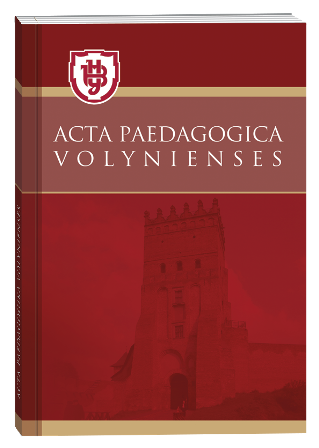SOCIAL AND EMOTIONAL LEARNING INTEGRATION INTO EARLY BILINGUAL EDUCATION OF PRESCHOOL CHILDREN
DOI:
https://doi.org/10.32782/apv/2025.3.3Keywords:
social and emotional learning (SEL), content and language integrated learning, bilingual education, EU countries, pre-schoolersAbstract
The article examines current tendencies in preschool education in the EU countries. Namely social and emotional learning and bilingual education, which are successfully integrated and have common teaching methods and technologies. Neuroscience research undoubtedly proves the need for early social and emotional learning of pre-schoolers in order to form their social and emotional literacy, developing prosocial behaviour in future, and develop the skills to show empathy and tolerance. Children’s acquisition of these competencies has a long-lasting impact and ensures emotional well-being and mental health lifelong. At the same time with the introduction of social and emotional learning, there is an urgent need for bilingual education of preschool children, where they simultaneously learn their native and foreign languages. Content and Language Integrated Learning (CLIL) of foreign language is actively promoted into early education of preschool children in EU countries. Scientists have proved that pre-schoolers’ formation of social and emotional competencies during the implementation of Content and Language Integrated Learning is quite effective due to joint methods: the use of game technologies and visual materials, dialogic learning, team interaction, emotional support and motivation. An effective tool for social and emotional and content and language integrated learning is the pre-schoolers’ motor activities (physical education classes, dances, dramatizations), which contribute to the development of children’s strong- willed character traits, their team interaction, and improvement of internalization, i.e. the process of adopting the values of the children’s group. European integration processes in Ukraine indicate the need to introduce bilingual education in combination with social and emotional learning into the educational process of preschool educational institutions. Further scientific research will concern the creation and implementation of an effective model for the formation of social and emotional literacy of senior preschool age children in bilingual groups of preschool educational institutions of Ukraine.
References
Andúgar A., & Cortina-Pérez B. EFL teachers’ reflections on their teaching practice in Spanish preschools: A focus on motivation. Preschool Bilingual Education. 2018. Pp. 219–244. DOI: 10.1007/978-3-319-77228-8_8
Bierman K. L., & Motamedi M. Social and emotional learning programs for preschool children. In J. Durlak, C. Domitrovich, R. P. Weissberg, & T. Gullotta (Eds.). Handbook of social and emotional learning: Research and practice, 2015, pp. 135–151.
Center on the Developing Child at Harvard University. From Best Practices to Breakthrough Impacts: A Science- Based Approach to Building a More Promising Future for Young Children and Families, 2016. http://www.developing- child.harvard.edu
Collaborative for Academic, Social, and Emotional Learning. CASEL. Retrieved September 20, 2021. https:// casel.org/
Denham S. A., & Bassett H. H. Early childhood teachers’ socialization of children’s emotional competence. Journal of Research in Innovative Teaching & Learning, 12(2), 133–150, 2019. https://doi.org/10.1108/JRIT-01-2019-0007
Denham S. A., Bassett H. H., Zinsser K., & Wyatt T. M. How preschoolers’ social–emotional learning predicts their early school success: Developing theory-promoting, competency-based assessments. Infant and Child Development, 23(4), 2014, 426–454. https://doi.org/10.1002/icd.1840
Durlak J., Weissberg R., Dymnicki A., Taylor R. & Schellinger K. The impact of enhancing students’ social and emotional learning: A meta-analysis of school-based universal interventions. Child Development, 82(1), 2011, 405–432. http://www.jstor.org/stable/29782838
Eurydice. Content and Language Integrated Learning (CLIL) at school in Europe. 2006. https://op.europa.eu/en/ publicationdetail/-/publication/756ebdaa-f694-44e4-8409-21eef02c9b9b
Ingemarson M., Rosendahl I., Bodin M. & Birgegard A. Teacher’s use of praise, clarity of school rules and class- room climate: Comparing classroom compositions in terms of disruptive students. Social Psychology of Education, 23(1), 2019, pp. 217–232. https://doi.org/10.1007/s11218-019-09520-7
Jennings P. A., & Greenberg M. T. The prosocial classroom: teacher social and emotional competence in rela- tion to student and classroom outcomes. Review of Educational Research, 79(1), 2009, pp. 491–525. https://doi.org/ 10.3102/0034654308325693
Jones D. E., Greenberg M. & Crowley M. Early social-emotional functioning and public health: the relation- ship between kindergarten social competence and future wellness. American Journal of Public Health, 105(11), 2015, pp. 2283–2290. https://ajph.aphapublications.org/doi/full/10.2105/AJPH.2015.302630
Kahn J., Bailey R. & Jones S. Coaching social & emotional skills in youth sports. Aspen Institute. 2019. http://files.eric.ed.gov/fulltext/ED603548.pdf
Laible D., Carlo G., Murphy T., Augustine M.& Roesch S. Predicting children’s prosocial and co-operative behavior from their temperamental profiles: A person-centered approach. Social Development, 23(4), 2014, pp. 734–752. https://doi.org/10.1111/sode.12072
Maccari S., Krugers H., Morley-Fletcher S., Szyf M. & Brunton P. The Consequences of Early-Life Adversity: Neurobiological, Behavioural and Epigenetic Adaptations. Journal of Neuroendocrinology, 26(10), 2014, pp. 707–723.
Kalland Mirjam M. & Linnavalli T. Associations Between Social-Emotional and Language Development in Preschool Children. Results from a Study Testing the Rationale for an Intervention, Scandinavian Journal of Educational Research, 67:5, 2023, pp. 791–804. DOI: 10.1080/00313831.2022.2070926
Mortimore L. CLIL and Social and Emotional Learning in Early Bilingual Education: Compatible and Mutually Beneficial. Journal of Language Teaching and Research, Vol. 14, No. 4, 2023, pp. 903–911. DOI:https://doi.org/10.17507/jltr.1404.06
Pakarinen E., Lerkkanen M. & Von Suchodoletz A. Teacher emotional support in relation to social competence in preschool classrooms. International Journal of Research & Method in Education, 43(4), 2020, pp. 444–460.
Sim F., O’Dowd J., Thompson L., Law J., Macmillan S., Affleck M., Gillberg C.& Wilson P. Language and social-emotional problems identified at a universal developmental assessment at 30 months. BMC Pediatrics, 13(1), 2013, p. 206. https://doi.org/10.1186/1471-2431-13-206








